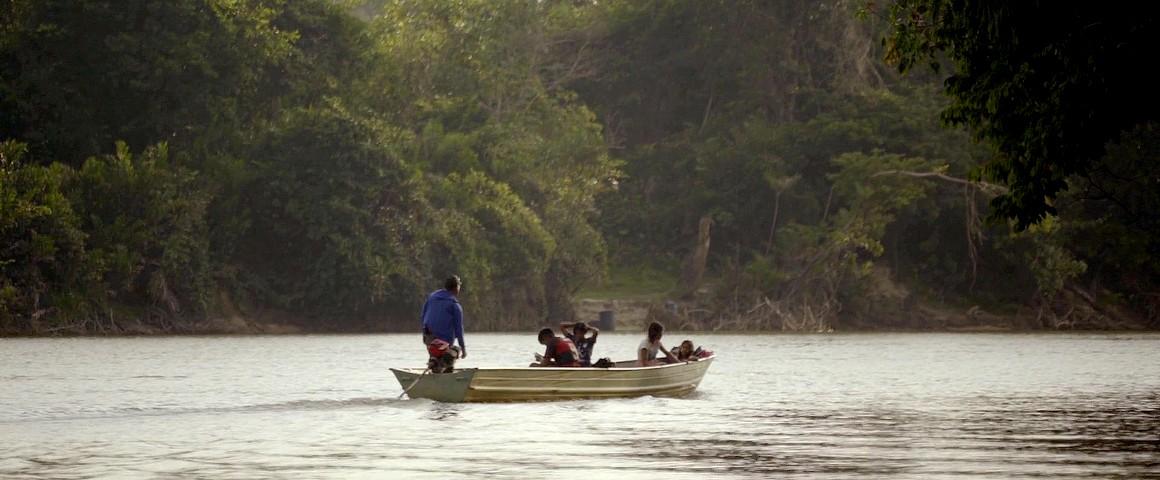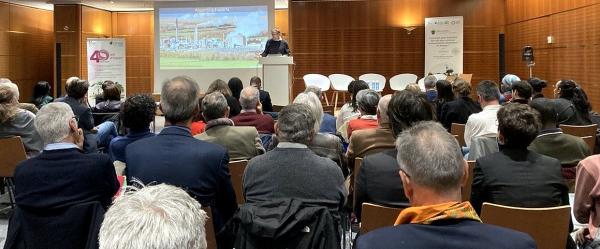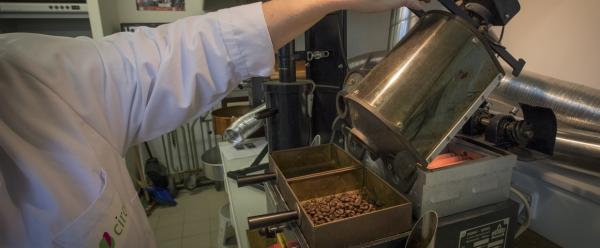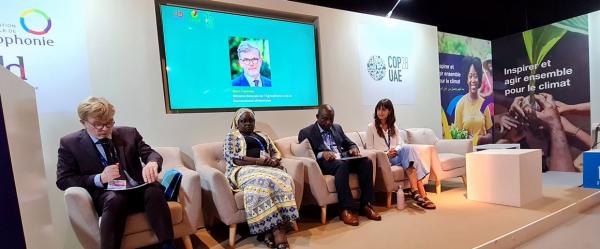Event 7 March 2024
- Home
- CIRAD news
- News
- Recap on Amazon Summit
The Amazon: putting local communities back at the heart of considerations

“During both the Dialogues and the Summit, we saw this determination to put local communities back at the heart of forest management policies”, says Plinio Sist, an ecologist at CIRAD
The leaders of the eight Amazon countries (Brazil, Bolivia, Colombia, Guyana, Ecuador, Peru, Suriname and Venezuela) met in the Brazilian city of Belém on 8 and 9 August this year. Prior to this political summit, scientists, NGOs, members of civil society and other public representatives met during the “Amazon Dialogues”.
Alongside their partners, several scientists from CIRAD contributed to the Dialogue days and attended the debates during the Summit. We look back with them on the ambitions raised by these two events in a context of urgency faced with the deforestation of the Amazon.
Local communities and forests at the heart of concerns
"The ‘holistic’ approach to forests very rapidly took precedence in the discussions”, says Plinio Sist, Head of CIRAD’s Forests and Societies research unit. The forest ecologist continues: “Too often we limit forests to their wood resources or their carbon storage capacities. In Brazil, during the Dialogues and the Summit, we saw this determination to put local communities back at the heart of forest management policies. This implies also seeing forests as a source of livelihood improvement for societies and combining their different dimensions – economic, cultural, health, ecological, etc". This vision has guided CIRAD and its partners in recent years, and was advocated in two recent policy briefs by the Comité Scientifique et Technique Forêt (CST Forêt – Scientific and technical committee on forests), set up by Agence Française de Développement (AFD).
The Belém Declaration, signed during the political summit, also underlines the role of local communities in the implementation of sustainable forest management. Indigenous peoples are cited as being best placed to protect the forest, through their farmer- or community-based management systems.
“The Amazon societies are also central to the Declaration as a tool for the conservation of forests and biodiversity”, adds Plinio Sist. “This is an ambitious strategy that establishes sustainable management for the most vulnerable populations as both a conservation tool and a tool for social and economic emancipation. There is still a long way to go, as it will be necessary to create enabling conditions for these farmer- and community-based management systems within current forest legislation”
Beyond forests, the sustainable development of societies
In addition to forest protection, the declaration insists on the importance of guaranteeing development solutions for the Amazon peoples, including through sustainable agricultural activities. "This is new at this level of responsibility", says René Poccard-Chapuis, a geographer at CIRAD and an expert in livestock production and territorial development in the Amazon Basin.
During the Dialogues, several sessions echoed this message, showing the Amazon’s potential for sustainable agriculture. Many solutions are based, for example, on renewable natural resources such as solar radiation and rainfall, or on collaboration between different agricultural sectors in the same area.
According to Gabriel Resque, a scientist at the Centre for Agricultural Science and Rural Development at the Federal University of Pará (UFPA-NCADR) in Brazil, "the current challenge in the Amazon is to reconcile ecological objectives and socio-economic issues. Our goal is to identify innovations that contribute to the development of communities in the region without destroying the forest". In particular, the researcher coordinates the Amazônia platform in partnership, a network of research and development institutions in the Amazon that includes the Instituto Amazônico de Agriculturas Familiares (UFPA-INEAF – Amazon institute of family farming), EMBRAPA, the Federal University of Pará and CIRAD.
Coordinating interventions at different levels, from the local to the global
The Belém Declaration underlines the fact that the scale of the impacts of deforestation in the Amazon can only be understood at the regional level. The participants in the Dialogues focused in particular on disturbances in the water cycle observed in the western territories and caused by deforestation and land degradation in the east. "This climate phenomenon clearly shows the regional nature of this problem and the need for political coordination between countries", says Plinio Sist.
The leaders also called for cooperation beyond the Amazon basin, between all tropical forest zones. The goal is to deliver proposals that are common to the Amazon, the Congo and the Borneo-Mekong basins at the next Climate COPs.
In conjunction with this regional vision, the countries also supported a “territorial” approach to the implementation of innovative solutions. The territory, through its local dimension and its capacity for consultation, emerged as a critical scale to address the challenges of sustainability. The Brazilian government gave examples of sustainable development initiatives in several municipalities, and presented plans to finance new ones. This choice demonstrates the relevance of the projects supported by CIRAD, such as TerrAmaz or Sustenta & Inova.
"We are seeing a desire to act in a concerted manner on several levels", says Marie-Gabrielle Piketty, an economist at CIRAD. "Restoration or sustainable management actions have more positive impacts when they are coordinated at the territorial level, such as that of a municipality. Regional coordination makes it possible to build a network of territorial initiatives to ensure they work in synergy with actions conducted on larger scales. This could be in the field of green finance policies or of regulations concerning payments for ecosystem services. Moreover, some solutions implemented in one place may work elsewhere, with some adjustments. It is therefore important to guarantee that these territories can exchange and forge links between themselves and between the actors responsible for these innovations."
Marie-Gabrielle Piketty is a researcher in the Knowledge, Environment and Societies research unit, and leads the TerrAmaz project. Financed by AFD, TerrAmaz supports a number of innovative solutions implemented by five Amazon territories working to reconcile a sustainable agricultural transition, the conservation and restoration of forest resources and social inclusion. Research is conducted there according to territorial approaches, which are based on the consultation and participation of all stakeholders. "The TerrAmaz sites are located in Brazil, Colombia, Peru and Ecuador", says the researcher. "One of our objectives is to connect our partners through these territorial experiments, across the whole Amazon basin".
Scientific cooperation combining basic research and development
In their declaration, the leaders insist on the importance of cooperation between the scientific organisations across the region, as well as the mobilisation of contributions from external institutions. "Monitoring tools, public resource management, assessment methods, the development of good agricultural practices, social engineering on participation and the co-construction of knowledge, the creation of reference databases, and the enhancement of biodiversity: there is no shortage of research subjects and partners in the Amazon", says René Poccard-Chapuis. A geographer from CIRAD’s Tropical and Mediterranean Animal Production Systems research unit, he has been living in the Brazilian Amazon for 15 years. He works from the EMBRAPA premises, the leading agricultural research centre in Brazil.
In particular, René Poccard-Chapuis coordinates the TerrAmaz activities in Paragominas, a Brazilian municipality that has been working for years towards the sustainable management of its territory. Landscape restoration, water quality improvement, sustainable and profitable livestock practices, etc. "This goes well beyond basic science", says the researcher. "By considering the territory in all of its components, especially forestry, agricultural and social, we develop research methods that are connected to the world of development and local public management. This is what enables us to propose operational tools that reconcile biodiversity conservation and livelihood improvement for local communities."
"The Summit and the Dialogues greatly stimulated the discussion with civil society", says Gabriel Resque. "The communities in the region will be the most directly concerned by the actions implemented for this region, so their representation and participation were essential". For the Amazônia platform, the Dialogues and the Summit were the opportunity to meet new potential partners. The network was recently extended to cover other Amazon countries and territories, especially Colombia, Peru and French Guiana. "We are already involved in applied research in the field, in collaboration with non-scientific partners such as public institutions, private companies and NGOs. This cooperation enables us to have an impact on public policies and to transform farmers’ production systems."
According to the scientists, the Summit could serve as a catalyst for numerous collaborations between research organisations. During the debates, there was talk of creating an institution equivalent to the IPCC for the Amazon. In addition, the Dialogues succeeded in bringing together for the first time since 2019 the Science Panel for the Amazon, an international network of more than 240 scientists with expertise in the region, of which Plinio Sist is a member.
French Guiana, a French territory in the Amazon
The exchanges during the Summit underlined the responsibility of other countries in terms of financing for the climate transition, but also their role in effective scientific cooperation that delivers solutions. "The Belém Declaration is also a call to develop a real cooperation between Europe and the Amazon on the fight against imported deforestation", says Plinio Sist, "and this will depend not only on controlling the products traded, but also on supporting the producers that commit to sustainable pathways".
France has a specific role to play in Amazon cooperation, since the Amazon also stretches across one of its territories. "French Guiana shares numerous issues with its neighbours, such as illegal gold mining and other illicit mining operations", says Plinio Sist. "It is also a territory that has for many years been developing observation tools for forest restoration and sustainable forestry methods."
In the field of livestock farming or perennial crops such as coffee and cocoa, the measurement systems set up in French Guiana would benefit from the creation of networks with sites in other Amazon countries. Training, biodiversity enhancement, assessment methods and impact measurements are some of the fields of cooperation for the public and private sectors in French Guiana. Several research projects have already been conducted, such as Açai’action, which focused on acai berries and was based on close collaborations between Suriname, French Guiana and Brazil.


























